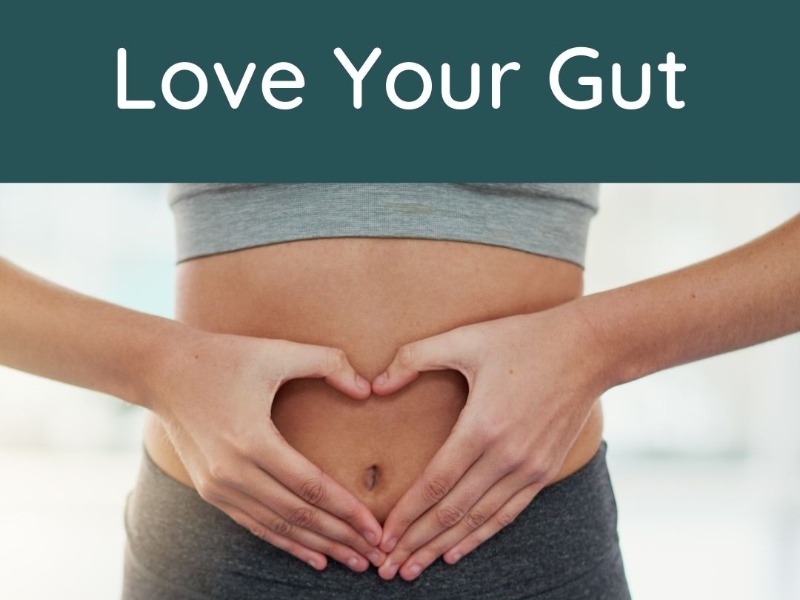10 Ways to Love Your Gut (and Improve Digestion)

by Dr. Sofie Desforges-Bell, Naturopathic Doctor and
Lyne Desforges, Registered Holistic Nutritionist & Culinary Nutrition Expert
You Are What You Eat?
You are what you eat, right? Actually, it’s not that simple. You may have the healthiest diet in the world but if your digestive system is not breaking down the food and absorbing the nutrients, then it is not serving you. There are many ways you can improve your digestion and ensure that you are reaping all the benefits from your wholesome diet. Here are our top 10.
#1 – Rest and Digest
Take three deep breaths before starting your meal. This puts your body into para-sympathetic mode, which is your “rest and digest” mode. A stressed body can impede or slow digestion. So sit down at a table, relax, and enjoy your food. Digestion starts in your brain. By using your senses of smell, sight and taste, you get into digestion mode. This is the cephalic phase of digestion. The cephalic phase is a conditioned reflex and it promotes the secretion of saliva and stomach acid. 30-50% of gastric secretions happens even before your food enters your mouth.
#2 – Chew Your Food
The mechanical breakdown of food happens in the mouth. The more you chew, the easier it will be for your stomach to continue the digestion process. Aim for at least 25 chews per bite. This will also increase saliva production. Saliva contains amylase which is a digestive enzyme that helps to break down carbohydrates into sugars which your body can more easily absorb. Saliva also contains lipase, an enzyme which breaks down fats. By eating slowly and mindfully, you give your body a chance to let you know when it is full. Put your utensils down between every bite. Savour the food and engage all your senses in the experience.
#3 – Practice Hara Hachi Bu
Hara Hachi Bu, is the Japanese practice of eating until 80% full. This helps in maintaining a healthy weight. By avoiding overeating, you also avoid gastrointestinal problems, acid reflux and metabolic disorders. Control your portion size. Use a smaller plate and take a smaller serving, so you can better control the amount you eat. By eating slowly and mindfully, you will be more aware of any satiety cues your brain is sending you.
#4 – Take A Food Break
Eating large meals or snacking constantly can challenge your stomach’s ability to digest effectively. Ideally, you want to space out your meal at least 4 hours apart. This allows the migrating motor complex to complete a full cycle in which all residual food is swept through the digestive tract. If you eat well-balanced meals containing protein, fibre and healthy fats, you will be stay satiated longer and will not feel the need to snack. Avoid late-night eating. Stop eating at least two hours before going to bed. This will also improve your sleep. Aim to go a minimum of 12 hours between dinner and the next day’s breakfast.
#5 – Stay Hydrated
Drinking enough liquids is important . You need lots of liquids to help produce gastric juices, saliva, and to encourage good elimination. Research has associated reduced fluid intake with an increased risk of constipation. If drinking water with your food is painful, causes acid reflux, or makes your feel bloated, then it is better to only take small sips with your meals or avoid any liquid altogether. Wait for one hour after your meal to resume drinking water.
#6 – Eat Gut-Friendly Food and Beverages
Consume lots of fibre-rich whole plant-based foods. This may help improve your gut microbial diversity and regulate your bowel movements. Adding foods rich in polyphenols such as berries, cocoa, grapes, and tea, have been shown to be beneficial to the gut microbiota. Including probiotics and prebiotics is essential for a healthy gut. Probiotic foods are fermented foods that add beneficial live organisms to the gut. These include sauerkraut, kimchi, kefir, yogurt, miso, kombucha, tempeh, etc. Prebiotic foods are foods that feed the gut bacteria. These include a variety of fruits, vegetables and grains. Consider following our CLV Gut Healing 7-Day Meal Plan as a starting point.
#7 – Reduce or Eliminate Inflammatory Foods
By adopting a whole foods diet, we automatically eliminate a large number of inflammatory foods that may damage the gut lining, disrupt the gut bacterial balance, and trigger digestive symptoms. If you experience any digestives issues, you may want to reduce or eliminate the following: processed foods, fried foods, carbonated beverages, fructose, gluten (especially for celiac), high-fat diets or large meals high in fat, and saturated fats found in animal products and dairy.
#8 – Stimulate Stomach Acid
As we age, our body’s ability to produce gastric juices & enzymes diminishes. To determine if you produce enough stomach acid, take our Baking Soda Test. If your stomach acid is low, you can take a tbsp of apple cider vinegar in a small amount of water 15 minutes before a meal, or drink some warm water with juice from 1/4 lemon. Another way to stimulate stomach acid production is to use bitters or eating bitter foods such as arugula, dandelion greens, green tea, dill, kale, sesame seeds, turmeric, ginger, cocoa, etc.. In some cases, it may be recommended to supplement with Betaine HCl and digestive enzymes such as BioDigest. You can purchase directly from our online store.
#9 – Move Your Body
Regular physical activity may prevent digestive issues by stimulating the gut and increasing intestinal activity. It increases blood flow to all your muscles, including the muscles of the digestive system helping food to pass through more quickly. Taking part in regular movement also reduces stress and inflammation which may have protective effects against digestive issues such as IBD. Of course, moderation is key as high-intensity exercise may trigger more inflammation and suppression of the immune system. A systematic review found that a regular yoga practice is associated with a reduction in IBS severity, bowel problems, and anxiety.
#10 – Prioritize Your Sleep
Research shows that there is a strong association between sleep dysfunction and gastrointestinal diseases. This may be the result of an increase in the production of cytokines during poor sleep. These pro-inflammatory substances have been seen in certain gastrointestinal diseases such as GERD (gastroesophageal reflux disease), IBD, liver disorders, and colorectal cancer. Conversely, digestive issues may impede your ability to get a good night’s sleep. You can read more on how to improve your sleep with our Sleep 101 series of blogs.
We Can Help
Improving digestion is often one of the first steps we take when tackling any health issues with patients and clients. A healthy gut means a healthy mind and vice versa. If you need more help improving your digestion and the health of your gut, book a free meet and greet with Dr. Sofie to discuss how she can help you. If you would like to try out a CLV Gut Healing 7-Day Meal Plan that is rich in gut-healthy foods, go to our online shop here.

I was drawn to naturopathic medicine as it allows me to explore the root cause of disease in a holistic manner. I love incorporating evidence-based natural medicines with more traditional therapies. By individualizing treatment plans to address each patient’s unique health journey, I guide my patients to optimize their physical, mental-emotional, and spiritual wellbeing.
